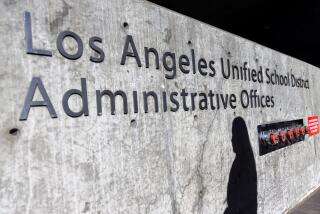First-Graders in Moorpark Receive Lesson in AIDS Prevention : Education: Program aims to allay fears young children may have about the epidemic.
- Share via
Moorpark schools have become the first in Ventura County to teach AIDS prevention to first-grade students, although the new curriculum sidesteps discussion of unprotected sex and other primary ways the disease is spread.
Launched this year, the Moorpark Unified School District’s new AIDS education program aims to allay fears young children may have about the epidemic.
And it teaches the youngsters certain health habits to help guard against the disease: stay clear of dirty needles, keep away from razor blades and avoid touching another person’s bloody nose.
“It’s very basic information,” Moorpark school trustee Pam Castro said. “And it’s necessary information, like telling them to stay away from guns.”
For young students, however, she said: “We’re not getting into the intricacies of the disease.” Nor does the instruction cover sex education or sexual transmission of the disease.
State law requires schools to teach AIDS prevention in the seventh grade and at least once in high school.
Many Ventura County school districts have gone beyond this minimum requirement. Some, beginning as early as the third grade, teach about the causes of the HIV infection that leads to acquired immune deficiency syndrome.
But in Moorpark, a committee of parents, teachers, local clergy and medical professionals decided they wanted to begin earlier.
Despite some parents’ concerns that elementary school children are too young to learn about AIDS, the committee said the district should teach AIDS prevention in the first, third, fifth, seventh and ninth grades, Assistant Supt. Frank DePasquale said.
Previously, Moorpark teachers introduced the topic in the seventh grade.
And they will still postpone frank discussions of the primary causes of AIDS, such as unprotected sex and intravenous drug use, until students are in junior high.
But many younger students have already heard about the AIDS epidemic on TV or from friends, officials said. And some of them have an inordinate fear of the disease because of misunderstandings of how it is spread.
“We’re trying to tell them that in large part they don’t have to worry about it, but that they need to take some basic precautions,” said Scott Fullerton, a health teacher and AIDS program coordinator.
“You don’t get AIDS the way you catch a common cold,” DePasquale said. Even with the limited scope of the elementary-school AIDS curriculum, the district agreed to teach the subject only to students whose parents sign a consent form.
So far, most parents have agreed to have their children included.
At Mountain Meadows School, only about 35 of 215 parents withheld their consent this year for the instruction. The district’s other two elementary schools with first-grade classes have not yet begun the AIDS classes, DePasquale said.
Even though families have a choice about whether their children should participate, two parents are objecting to school officials about the new curriculum.
Parent Jeanine Matula said she is concerned that children who aren’t in the class when AIDS is discussed will learn about it from their classmates.
“Then they’ll come home with questions,” Matula said. “I don’t think at that age a child is ready psychologically to deal with this, and I don’t want to have to answer those questions until they are.”
But Judy Seyle, director of health programs for the county superintendent of schools, said limited discussions of AIDS education are appropriate for even the youngest students.
“Just because you’re doing AIDS education doesn’t mean you’re teaching about sexual intercourse,” Seyle said. “There are some preventive behaviors that are important for all humans to learn early on.”
More to Read
Sign up for Essential California
The most important California stories and recommendations in your inbox every morning.
You may occasionally receive promotional content from the Los Angeles Times.













